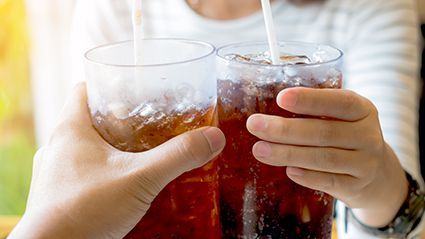THURSDAY, Jan. 7, 2021 (HealthDay News) — After a short-lived tax on sugar-sweetened and artificially sweetened beverages was repealed, consumption of sugary drinks in an Illinois County escalated again, according to a new study.
The tax was pitched to reduce Cook County budget deficits. It lasted four months — from Aug. 2 to Dec. 1, 2017, the researchers said.
“We know that the tax worked to bring down demand for sweetened beverages significantly while it was in place,” said lead author Lisa Powell, director of health policy and administration at the University of Illinois Chicago, School of Public Health.
“The repeal of the Cook County Sweetened Beverage Tax was a missed public health opportunity,” Powell said. “If it had stayed in place, we could have seen a lasting reduction in consumption of sweetened beverages, which are linked to obesity, type 2 diabetes and cardiovascular disease, which, in turn, have recently been found to be associated with increased risk of severe illness from COVID-19.”
For the study, the researchers compared the price and volume of sweetened beverages sold in the county while the tax was in place, for the two years prior to the tax and for the eight months after the tax was repealed, with sales in St. Louis, Mo., which did not have a similar tax.
The price of the beverages increased by 1.13 cents per fluid ounce in the county while the tax was in place and dropped by 1.19 cents per fluid ounce after the repeal. The volume sold dropped by about 26% under the tax and increased by about 30% after the tax was repealed, the researchers said.
But, ultimately, the investigators found no net change in the volume of sweetened beverages sold pre-tax compared to after the tax was repealed.
“Volume of sweetened beverages sold in Cook County went right back to pre-tax levels following the repeal of the tax,” Powell said in a university news release.
The results suggest that the tax worked to bring down demand for sweetened beverages through price point alone, she noted. It did not appear to change perceptions regarding the harms linked to consuming sugary beverages. Public messaging about the tax focused mostly on proceeds being used to address budgetary deficits rather than on public health.
“We don’t know if public messaging were more focused on health benefits if there would have been some lasting impact of the tax, but as it stands, we see that the substantial impact from the tax fully disappeared once it was repealed,” Powell said.
The study was published online recently in JAMA Network Open.
More information
The U.S. Centers for Disease Control and Prevention has more about sugar-sweetened beverages.
SOURCE: University of Illinois Chicago, news release, Jan. 4, 2021
Copyright © 2026 HealthDay. All rights reserved.

